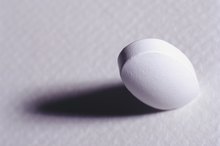Chromium Nicotinate Side Effects
Chromium is a mineral your body needs in order to maintain healthy blood sugar levels 1. Although health officials with the University of Maryland Medical Center (UMMC) recommend adults receive between 25 and 35 micrograms of chromium daily, nearly 90 percent of Americans have low-chromium diets 1. If your normal diet is deficient in chromium, your doctor may recommend treatment with a chromium supplement such as chromium nicotinate 1. Talk with your doctor about chromium nicotinate side effects before you begin taking this supplement 1.
If you are experiencing serious medical symptoms, seek emergency treatment immediately.
Dermatitis
While receiving treatment with chromium nicotinate, you may develop dermatitis or skin irritation as a side effect, Drugs.com reports 1. You may notice the appearance of red, dry patches of skin across your body. Dermatitis may also cause your skin to itch profusely. Excessively scratching irritated skin may increase your risk of developing a skin infection. If you develop severe or persistent skin-related side effects while taking this chromium supplement, seek additional care from a medical professional 1.
Upset Stomach
Brewers Yeast & Bodybuilding
Learn More
Chromium nicotinate may irritate your digestive tract, leading to the emergence of upset stomach side effects 1. You may feel nauseated, which may cause a decrease in your normal appetite. Treatment with this type of chromium supplement may also result in a susceptibility to stomach ulcers 1. Talk with your physician if you experience persistent stomach pain, nausea or vomiting or notice blood in your stools or vomit.
Headache or Dizziness
Headache pain or dizziness may occur as side effects of this supplement, RxList reports. Persistent or recurrent headache pain may be disruptive and can affect your ability to remain productive throughout your daily activities. If you experience dizziness, remain seated until this sensation passes in order to limit your risk of injury from tripping or falling down.
- Headache pain or dizziness may occur as side effects of this supplement, RxList reports.
- Persistent or recurrent headache pain may be disruptive and can affect your ability to remain productive throughout your daily activities.
Overdose
Zinc Citrate Side Effects
Learn More
Consuming large doses of chromium nicotinate may lead to heart rate irregularities or liver damage, the UMMC warns 1. These overdose symptoms may result in permanent organ damage. Seek prompt care from your doctor if you develop any signs or symptoms of a chromium overdose while taking this supplement 1.
Related Articles
References
- Drugs.com: Chromium
- RxList: Chromium - Are There Safety Concerns
- Hua Y, Clark S, Ren J, Sreejayan N. Molecular mechanisms of chromium in alleviating insulin resistance. J Nutr Biochem. 2012;23(4):313-9. doi:10.1016/j.jnutbio.2011.11.001
- Cerulli J, Grabe DW, Gauthier I, Malone M, Mcgoldrick MD. Chromium picolinate toxicity. Ann Pharmacother. 1998;32(4):428-31. doi:10.1345/aph.17327
- Navarro VJ, Khan I, Björnsson E, Seeff LB, Serrano J, Hoofnagle JH. Liver injury from herbal and dietary supplements. Hepatology. 2017;65(1):363-373. doi:10.1002/hep.28813
- Food and Drug Administration. Food labeling: revision of the nutrition and supplement fact labels. Published May 27, 2016.
- U.S. Food and Drug Administration. Chromium 4 mcg/mL chromic chloride injection, USP. Updated April 2002.
- Brownley KA, Von Holle A, Hamer RM, La Via M, Bulik CM. A double-blind, randomized pilot trial of chromium picolinate for binge eating disorder: results of the Binge Eating and Chromium (BEACh) study. J Psychosom Res. 2013;75(1):36-42. doi:10.1016/j.jpsychores.2013.03.092
- National Institutes of Health: Office of Dietary Supplements. Chromium. Updated July 9, 2019.
- Chromium: Dietary Supplement Fact Sheet. National Institutes of Health. Updated July 9, 2019.
- Iovieno N, Dalton ED, Fava M, Mischoulon D. Second-tier natural antidepressants: Review and critique. J Affect Disord. 2011;130(3):343-357. doi:10.1016/j.jad.2010.06.010
Writer Bio
Rae Uddin has worked as a freelance writer and editor since 2004. She specializes in scientific journalism and medical and technical writing. Her work has appeared in various online publications. Uddin earned her Master of Science in integrated biomedical sciences with an emphasis in molecular and cellular biochemistry from the University of Kentucky College of Medicine.









